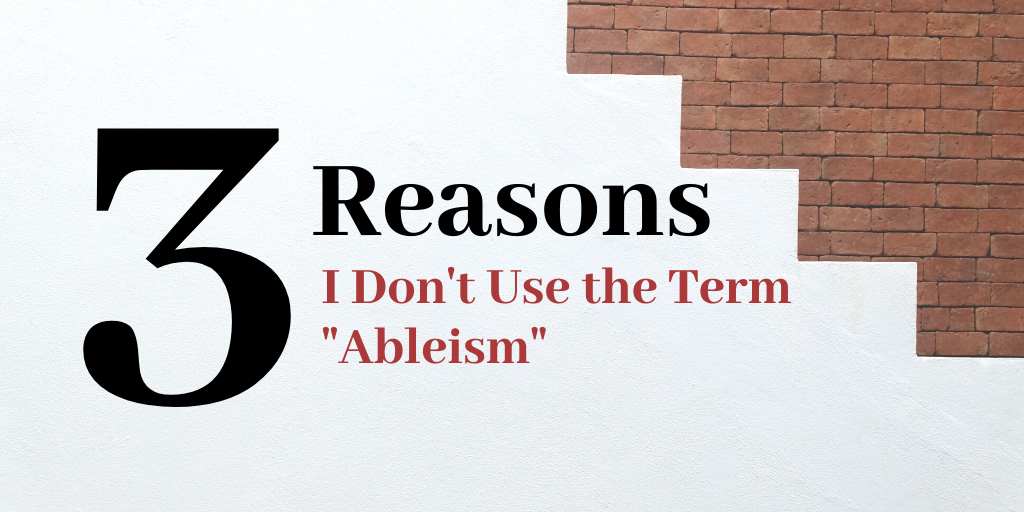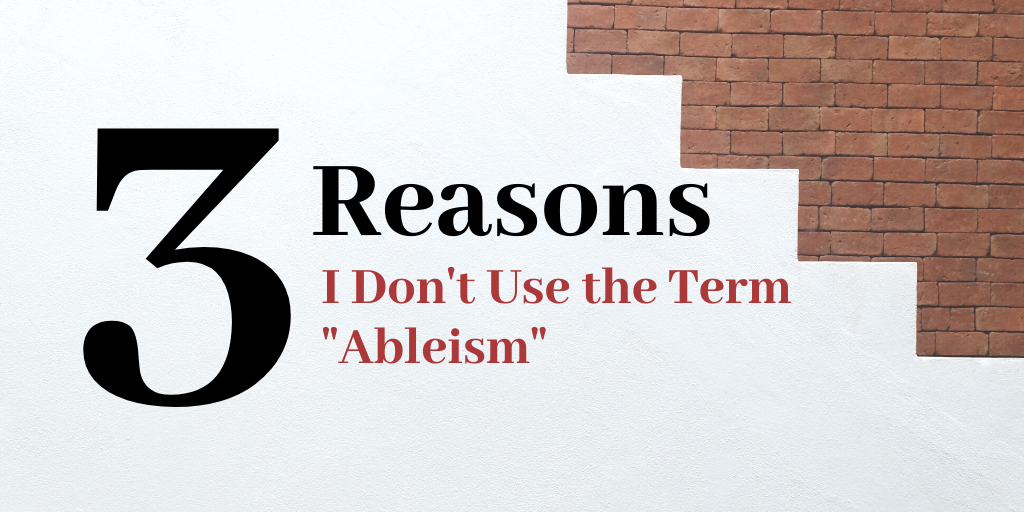 I’m a fan of the concepts behind political correctness. I think it’s important to use language with intention and care. I think language reflects reality, but I also think language can shape reality. For me, the shift from calling Penny a “Down syndrome baby” to a “baby with Down syndrome,” for instance, was more than a linguistic shift. It was a reflection of a shift in my thinking about who counted as fully human. And yet I avoid certain politically correct words most of the time, including the word “ableism,” which the dictionary defines as “discrimination in favor of able-bodied people.” I believe this concept is both true and helpful in perceiving the world. But I never use that word. Here are three reasons why I don’t use the word ableism.
I’m a fan of the concepts behind political correctness. I think it’s important to use language with intention and care. I think language reflects reality, but I also think language can shape reality. For me, the shift from calling Penny a “Down syndrome baby” to a “baby with Down syndrome,” for instance, was more than a linguistic shift. It was a reflection of a shift in my thinking about who counted as fully human. And yet I avoid certain politically correct words most of the time, including the word “ableism,” which the dictionary defines as “discrimination in favor of able-bodied people.” I believe this concept is both true and helpful in perceiving the world. But I never use that word. Here are three reasons why I don’t use the word ableism.
1. It alienates people who don’t know what the word means.
As a result, it’s a word that can be used as a weapon or a wall rather than a path for mutual engagement and potential connection and understanding. Every academic discipline, every cultural community, every group of specialists, have “insider” language. Within the disability community in particular and the liberal/progressive political community more broadly, words like “ableism” and “ability culture” can easily become a way to identify the people who are knowledgeable and/or on the same side. But there are whole groups of people who might be interested in the concept of ableism and who might recognize the value of people with disabilities but become automatically excluded based on not knowing what the word “ableism” is referring to.
For me, coming to understand and believe in the concept of ableism was kind of like the scene in the movie The Matrix where Keanu Reeves’ character first sees that the world is not as it appears. Ableism emerges out of the idea that social norms create what we call disability. We don’t think of people who wear glasses as disabled, for instance. If our culture didn’t have ready access to opticians and optometrists, however, people in need of glasses would be at significant disadvantages. Similarly, a city that has accessible public transportation and curbs with ramps makes mobility easier for a person in a wheelchair. My friend Jessica, who has cerebral palsy and walks with canes, experiences “disability” very differently from place to place, depending on the architecture and attitudes of the structures and cultures she visits.
The same is true on an intellectual level. In a culture that assumes academic achievement is the key to a successful and meaningful life, having an IQ below the average range is a severe disadvantage. In a culture that assumes that every human being has both needs and gifts, however, then a person with an intellectual disability can participate meaningfully out of his or her own distinct abilities and perspectives even as s/he expresses need. (The L’Arche communities and Friendship House serve as examples of places where this is possible.)
2. It alienates people who will stop listening as soon as a politically correct term enters the conversation.
While there are certainly many people who are dismissive of the concept of ableism and other politically correct terms, there are others who have an automatic negative reaction to the words but not to the concepts behind them. If I can use language to convey the concept without using words that trigger automatic rejection, I will.
3. It’s a linguistic shortcut.
If I use words like “ableism” without defining what I mean, I can easily forget what it is that I’m talking about. But if I force myself to speak and write without using the word but while explaining and offering examples of the concept, then I am sharpening my own understanding, inviting other people into conversation, and contributing to the cause of elevating the typical population’s perception of people with disabilities.
In sum, I want the language I use to build bridges rather than erect barriers. I want to champion the common humanity of people across social divides so that we can celebrate diversity instead of feeling threatened by it.
If you haven’t already, please subscribe to my newsletter to receive regular updates and news. You can also follow me on Facebook, Instagram and Twitter.




